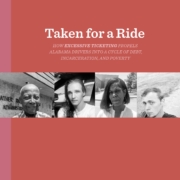by Eddie Burkhalter, Researcher

Richard Robertson
Traffic laws exist for good reason — including regulatory laws that require drivers to be licensed and carry insurance. But there is a reason these laws carry fines rather than incarceration as a penalty: violating them is common, and the lawmakers who set the penalties mean for them to be a financial inconvenience, not a life-changing catastrophe.
For people who lack the means to pay what they owe right away, though, that’s exactly what traffic tickets are.
Richard Robertson, 33, sat in the back of Anniston’s municipal court on Feb. 8, 2023, held his head in both hands and looked down at the floor as Judge James Sims talked with someone else about their traffic tickets.
His jeans, t-shirt and tennis shoes spattered with white paint, Robertson asked to borrow and write in an Appleseed researcher’s notebook. The court’s bailiff strictly enforces a no talking rule among those seated in court. On any given day in court at least one person is forced to wait in the lobby outside court after breaking that rule.
“Homeless,” Robertson wrote on the notepad. “Walk 40 miles…I’m a very well-mannered person. Lost everything. Had to walk here to stay out of jail. I’m just pissed and tired.”
Robertson owes $1,000, despite having only been ticketed for non-moving violations. His life has been turned upside down and stability is beyond his grasp, all because of the combination of poverty and traffic tickets.
He found work painting houses with an acquaintance, but getting to and from job sites was proving difficult, he explained. Robertson was also suffering from the lingering effects of a head injury he sustained after being hit by a vehicle, he said.
His car was impounded by the state trooper who last pulled him over, so the day before his court hearing Robertson walked those 40 or so miles to Anniston from the home of an acquaintance, where he’d slept the night before.
Once downtown, he made his way to the parking deck a short walk from the courthouse. As the darkness set in, he curled up in a corner of that parking deck and slept, assured he’d make his court hearing and prevent another arrest warrant for failing to appear. Unhoused persons often take shelter in that concrete structure in Anniston, as the Salvation Army closed its Anniston shelter in 2019, leaving no other emergency shelter for men in the city.
A search of Robertson’s court record on Alabama’s online database shows only a handful of traffic tickets handed out to him by state troopers over three traffic stops in 2007 and 2009. He was also stopped by an Anniston Police officer in January, which led to his court hearing in Sims’ courtroom the following month.
Robertson was pulled over in his 2003 Ford Taurus by a state trooper at 3:10 p.m. on Aug. 12, 2022, on Zinn Drive in Anniston and ticketed for an expired license.
Robertson on Sept. 7, 2022, was pulled over by an Alabama State Trooper at 4:05 p.m. on Joni Lee Drive in Anniston and was ticketed for failure to register a vehicle.
Calhoun County District Judge Randy Moeller on Nov. 22, 2022, filed an order noting that Robertson failed to show at a Nov. 9 hearing to discuss those tickets. He warned that if Robertson didn’t send the court a written motion to reset the court date, the judge would issue a warrant for his arrest on a failure to appear charge. A notice mailed to Robertson at a Munford house address on Dec. 8, 2022, was returned to the court as undeliverable.
Moeller on Jan. 5, 2023, issued that arrest warrant. Robertson was arrested on Feb. 2, 2023, court records show. He appeared before the judge from the Calhoun County Jail via webcam five days later, where he pleaded guilty and was set on a payment plan of $50 a month to pay off just more than $1,000 in court debt connected to those tickets.
Anniston Municipal Court Judge James Sims at the Feb. 22, 2022, hearing dropped the failure to appear charge, thereby saving Robertson the cost of additional fines and fees related to that charge. Sims also credited $125 to Robertson’s debt for serving those five days in jail, which all but took care of his court debt for the Anniston traffic ticket. Even so, he remained behind on paying tickets issued by state troopers.
With Robertson’s permission, Appleseed followed him to the city of Gadsden, which has more resources for the homeless and where he received clean clothes, regular meals and help finding a job — but that job was 10 miles from the shelter where he was staying. A donated bicycle promised him access to his job in February, but the bicycle was stolen the next day.
Robertson later made his way to the city of Boaz, 19 miles north Gadsden, where he found work with a construction crew framing homes. It was work he’d never done before but he was excited for a new start.
“I’m not great but I catch on fast,” Robertson texted Appleseed on Feb. 22 about his new job. Appleseed lost contact with Robertson after that text message, and numerous attempts to locate him have been unsuccessful.
A “payment delinquent notice” regarding his court debt was mailed to Robertson on March 14, 2023, according to court records, but it’s unclear where the court mailed that notice to. The address listed for Robertson in that court case is a Munford home, where he hasn’t lived for some time.





Leave a Reply
Want to join the discussion?Feel free to contribute!